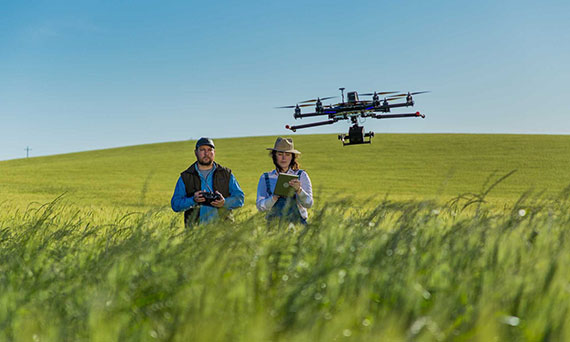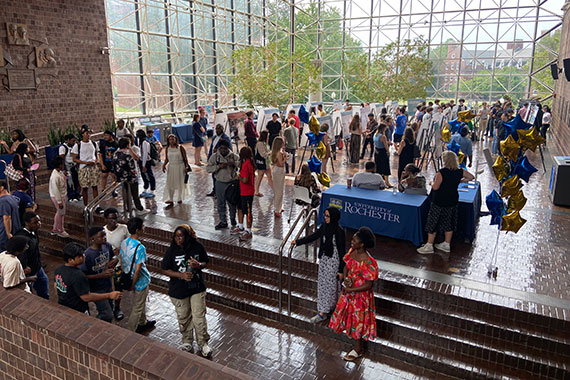August 4, 2025

Getty Images photo
Dear members of the Hajim School community,
A team of researchers led by Michael Huang, a professor of electrical and computer engineering, of computer science, and of data science and artificial intelligence, is embarking on an ambitious new project funded by DARPA to reimagine the artificial intelligence systems that guide drones and self-driving cars. Currently these systems rely on neural networks, but the digital computers they run on were initially designed for general-purpose computing tasks ranging from word processing to scientific calculations and have ultra-high reliability at the expense of high-power consumption.
To explore novel computer systems that are energy efficient particularly for machine learning, Michael and his team are developing new analog hardware, with the possible application toward more efficient drones. They will attempt to do so by abandoning conventional state-of-the-art neural networks developed on digital hardware for computer vision. Instead, they’re turning to predictive coding networks, which are based on neuroscience theories that the brain has a mental model of the environment and constantly updates it based on feedback from the eyes.
Read more about this exciting project at the News Center.
SUMMER RESEARCH SCHOLARS SHOWCASE WORK AT KEARNS SYMPOSIUM

Last week, the David T. Kearns Center for Leadership and Student Success hosted the 33rd annual Kearns Summer Research Symposium to celebrate the 2025 cohort of summer research scholars and provide them the opportunity to showcase their hard work. This summer, the Kearns Center welcomed nearly 40 students to campus who are participating in the Ronald E. McNair Post Baccalaureate Achievement Program or Research Experiences for Undergraduates (REU) Programs in nanophotonics, quantum photonics and vision/biomedical optics, and physics and astronomy.
Of note, we had 10 students participate in the photonics REU, which was led by Professor Andrew Berger from the Institute of Optics. Several Hajim students from the TRIO Ronald E. McNair Post-Baccalaureate Achievement Program also presented their summer research at the symposium, including Yahel Grullon ’27 (optical engineering), Maya Benavidez ’27 (biomedical engineering), Ulizes Atlixqueno ’27 (mechanical engineering), and Sejad Salah Al-Rubayie ’27 (electrical and computer engineering).
Thank you to all the faculty and staff who supported these bright scholars through transformative research experiences. Read more about the symposium at the Kearns Center website.
IN THE NEWS: GAURAV SHARMA TALKS QR CODE SECURITY

CNBC recently reported on the rise of “quishing” or QR code-based phishing scams and turned to Professor Gaurav Sharma from the Department of Electrical and Computer Engineering for his expert advice. Gaurav discussed why criminals are increasingly using QR codes for attacks, how he expects QR code scams to continue to grow, and the smart QR code technology he and Assistant Professor of Instruction Irving Barron are developing.
Read the story on the CNBC website.
CVS ANNOUNCES PILOT FUNDING FOR VISION RESEARCH
The Center for Visual Science recently announced that it awarded three research groups pilot funds to help establish collaborative novel research in vision science. The CVS Pilot Funds Program aims to foster collaboration across CVS members from different areas of research and help them collect pilot data for future grant applications. The principal investigators and their project titles are:
- Anna Majewska, the dean’s professor of neuroscience, and Associate Professor Houhui Xia from the Department of Pharmacology and Physiology—Monocular deprivation drives I-2-PP1 interactions at individual synapses in the mouse binocular visual cortex in vivo.
- Associate Professor of Ophthalmology Jesse Schallek and Associate Professor of Anesthesiology and Perioperative Medicine Andrew Wojtovich— The consequence of hyperglycemia on the metabolic machinery of retinal vision.
- David Williams, the William G. Allyn Professor of Medical Optics, Associate Professor of Brain and Cognitive Sciences Jude Mitchell, Assistant Professor of Ophthalmology Juliette McGregor, Assistant Professor of Ophthalmology Sara Patterson, and Professor of Ophthalmology William Merigan— Game-changing technologies for calcium imaging in the living primate eye.
Congratulations to all the awardees! Learn more on the CVS website.
NEWLY FUNDED RESEARCH
Congratulations to Professor Jim Zavislan from the Institute of Optics, who received $16,990 from ALLVAR through a subaward with the U.S. Army Medical Research & Development Command for a project titled, “Shear Plate Interferometry for Refractive Index and Thermal Defocus Determination.”
Have a great week!
Your dean,
Wendi Heinzelman